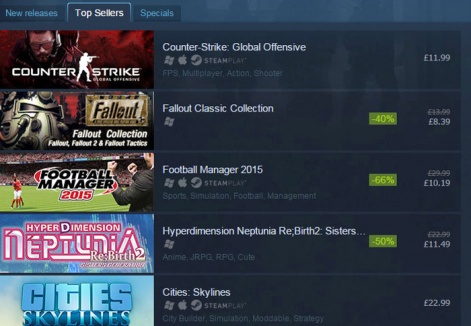There's currently a lot of hand-wringing going on over the topic of refunds on Steam.
While EU policies have helped, Steam is now offering non-fault refunds globally.
A lot of developers are lamenting over lost sales and the potential for fraud. I developers shouldn't worry about it: consumers should have the right to easily get refunds on digital products that they can't be guaranteed will be up to a certain quality - or will even work.
Giving them the right to get easy refunds will increase their confidence to spend money in the future.
Digital dilemma
Refund policies in this sector have largely not existed because, well, how do you return digital software? It's a concept that didn't make much sense before. But as sensibilities have changed.
Steam is now offering non-fault refunds globally.
Steam is a DRM system that can revoke content from a user's account, much like the App Store and Google Play. So once a game is refunded, it can be removed from a user's account without much issue.
Equally, there are no worries about new vs. used game issue when it's all just bits being transmitted digitally. Physical games have that concern, of course, losing value when they're returned.
DRM-free services having stricter refund policies, but even GOG.com has a refund policy that's basically 'if it doesn't work, we'll refund you'.
However, Steam is taking it a bit further by adding in a "I don't like it" refund.
Expanded remit
This is important, because you hear about consumers being unsure, that they don't know what they're getting from an app or a game.
If there was an easy process to say, "I gave this app a fair shake, I don't like it, I want my money back," why shouldn't stores offer the option if it helped consumers be more confident in their purchases?

Heck, maybe this will help stem the tide of free-to-play, making paid games and apps more viable because the risk is eliminated?
The obvious concern is that this system could be used for fraud. And sure, it's totally possible and likely it will happen. The reason why physical media has issues with refunds on opened products is because you don't want to just let people buy a game, beat it, and then return it.
Maybe this will help stem the tide of free-to-play, making paid games more viable because risk is eliminated?
Only allowing for returns in the circumstance of defective software has been the standard operating procedure for pretty much every retailer in the US for a long time now, though you hear stories of retailers that tried no-questions-asked return policies. There's a reason why no one else has them.
With Steam offering a liberal policy in allowing refunds before 2 hours of playtime and 14 days after purchase, you can see where people could take advantage of it.
In this context, developers of short games are worried that people could exploit the system to essentially play their games for free.
And that's not factoring in things like offline mode, and people possibly buying games on one computer, installing them and beating them while offline, and then going back online to request a refund.
Steam could find workarounds, and most people are going to be too lazy to do this sort of thing, but still: the potential exists.
A modest proposal?
Here's the ultimate thing, though: even if this is an exploitable system, I would rather it exists than the refund-free status quo.
When software's value $60 derived because it was 'new' rather than used, and in part also because corporations that had testing and approval processes to go through, then I could understand why open refunds might not make sense.
Customers could trust the product they purchased would work, because retailers and ultimately publishers and developers would take the hit in the case of widespread QA issues.
Now, however, we're in an era where anyone can make a game with little approval or testing, and a person who buys software could purchase something that wouldn't work.
It is a privileged position to say that you deserve all the benefits of independent development and global digital distribution without giving users some remedy toward not having the protections of big-box game-selling.
To-date, the status quo has been unfairly in developers' favor, and now consumers are getting something to tilt the balance back in their favor.
Of course, policies can also tighten, Google Play's refund policy was - and still is - very user-friendly, but we saw Google tweak it over time, reducing the refund window from 24 hours to 15 minutes.
I'd rather have a system that supports consumers ... even if it marginally disincentivizes developers.
I imagine Steam will tweak the policy too if fraudulent purchases become an issue.
Better in the longrun
So, while I'm receptive to the idea that a lot of indie developers need every penny they can get, I think that to complain about move is folly.
It's unfair to suggest consumers should take all the risk when buying a potentially-non-working game without any redress.
Similarly, if you're concerned your game is so short people might go for refunds within the allotted time, maybe do a better good job of making an experience so good they'll feel like your game deserves the money.
Or deal with it: if you want to make something very short, accept the risk that people might just 'rent' your short game.
I'd rather have a system that supports consumers and gives them rights to protect them even if it marginally disincentivizes developers. Some developers recognize that while it's not necessarily best for their bottom line, it does wonders for consumer confidence.
And more importantly, it makes sure that when someone spends money, they're happy they did so, which means they'll buy more games.






















